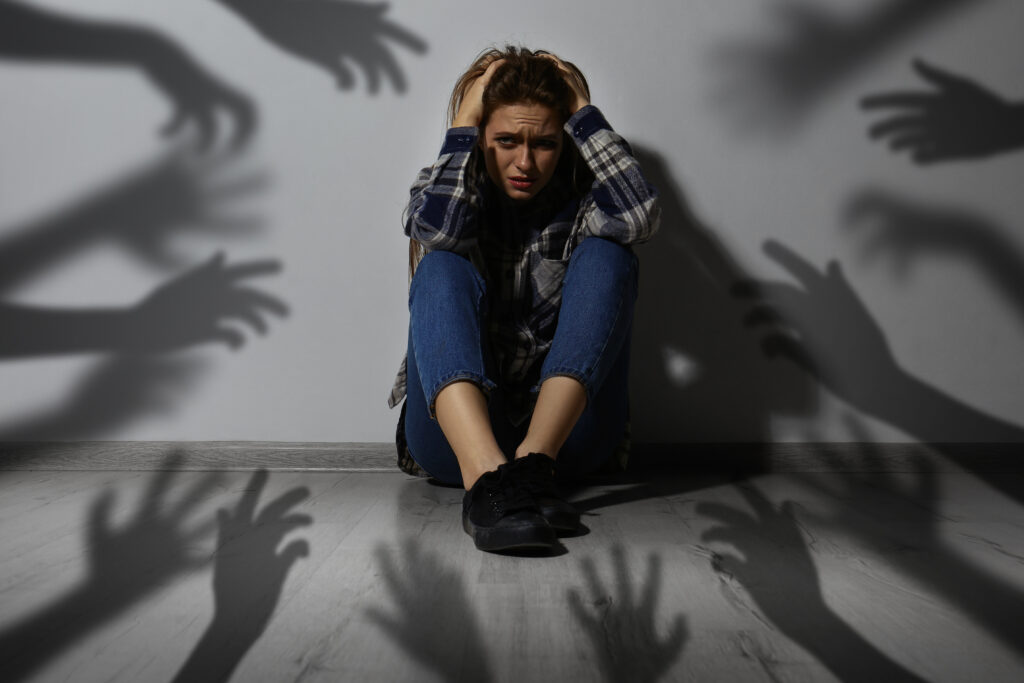Understanding Panic Disorder: More Than Just Anxiety
Panic disorder is a type of anxiety disorder marked by sudden, repeated panic attacks– intense surges of fear and discomfort that can strike without warning. These episodes are not just “nerves” or “worry. They are deeply distressing and can feel life-threatening, even when no real danger exists.
The physical symptoms can mimic a heart attack: chest pain, racing heart rate, shortness of breath, trembling, sweating, and dizziness. Emotionally, panic attacks often bring a sense of impending doom, fear of losing control, or even fear of dying.
Many people with panic disorder develop a persistent worry about when the next attack will occur, leading to avoidance of certain places or situations, sometimes resulting in agoraphobia, where leaving home feels impossible. This cycle can severely limit daily activities, social situations, and overall quality of life.
Common Symptoms of Panic Disorder
These symptoms can be so severe that many seek emergency medical care, convinced that something is physically wrong. Yet, for those with panic disorder, these attacks are recurring and unpredictable.
- Sudden, intense fear or discomfort
- Rapid, pounding heart rate (palpitations)
- Chest pain or tightness
- Shortness of breath or choking sensations
- Sweating, chills, or hot flashes
- Trembling or shaking
- Dizziness or feeling faint
- Numbness or tingling in hands or feet
- Nausea or abdominal distress
- Feeling detached from reality (derealization)
- Fear of losing control, going crazy, or dying

Why Panic Disorder Needs Professional, Evidence-Based Care
Living with panic disorder is exhausting, not just for those experiencing the attacks, but for their families and loved ones as well. The fear of another episode can lead to isolation, avoidance, and even substance use as a misguided attempt to cope.
Without proper mental health treatment, panic disorder can spiral into depression, substance abuse, or other mental health conditions like generalized anxiety disorder (GAD), obsessive-compulsive disorder (OCD), or social anxiety disorder.
Effective panic disorder treatment requires a comprehensive, personalized approach that addresses both the physical symptoms and the underlying thought patterns and behaviors fueling the cycle of fear. This is where Thoroughbred Wellness and Recovery stands apart in the Atlanta area.
Thoroughbred Wellness and Recovery: A Sanctuary for Healing in Atlanta
Serving the greater Atlanta, GA, area, Thoroughbred Wellness and Recovery is more than a treatment center- it’s a community dedicated to helping individuals rediscover hope, resilience, and authentic freedom.
Accredited by The Joint Commission, Thoroughbred Wellness and Recovery is recognized for its commitment to the highest standards of behavioral health and mental health care.
Evidence-Based Treatment Programs for Panic Disorder
Extensive research and clinical guidelines support effective treatment for panic disorder. The most widely recommended evidence-based treatment programs include the following.
Cognitive Behavioral Therapy (CBT)
CBT is the gold standard for panic disorder treatment, helping individuals identify and challenge the distorted thought patterns that trigger panic attacks. Through CBT, guests learn practical coping strategies, reduce avoidance behaviors, and break the cycle of anticipatory anxiety, panic, and agoraphobia.
Dialectical Behavior Therapy (DBT)
For those who struggle with emotional regulation or who haven’t found relief with CBT alone, DBT offers additional tools for managing intense fear and physical symptoms. DBT emphasizes mindfulness, distress tolerance, and interpersonal effectiveness, helping guests remain grounded during panic attacks and confidently navigate daily life.
Group and Family Therapy
Connecting with others who understand the struggle of panic disorder can be profoundly healing. Group therapy provides a safe space to share experiences, learn new coping strategies, and build a supportive community. Family therapy helps loved ones understand the condition, improve communication, and strengthen relationships, which are key components for lasting recovery.
Accelerated Resolution Therapy (ART)
A short-term psychotherapy that uses eye movements and voluntary image replacement to help guests change the way distressing memories are stored in the brain. ART is often used to treat trauma, anxiety, and depression, providing rapid relief from symptoms.
Equine Therapy
Also known as equine-assisted therapy, this approach involves interactions between guests and horses, guided by a therapist, to promote emotional growth, self-awareness, and healing. It can be helpful for trauma, anxiety, behavioral issues, and developmental disorders.
Rapid Resolution Therapy (RRT)
A therapeutic approach that uses guided imagery, storytelling, and hypnosis-like techniques to help individuals quickly clear the emotional effects of traumatic events and change problematic behavior or beliefs.
Trauma Therapy
An umbrella term for a range of therapeutic techniques designed to help individuals process and heal from trauma. These can include talk therapies (like CBT or EMDR), somatic therapies, and mind-body approaches aimed at reducing trauma-related symptoms and improving overall well-being.
Holistic and Experiential Therapies
Healing goes beyond symptom management. Thoroughbred Wellness and Recovery incorporates holistic practices such as yoga, mindfulness meditation, breath work, fitness, and art therapy to support overall wellness and quality of life. Equine-assisted therapy offers unique opportunities to build trust, confidence, and emotional regulation in a calming, natural environment.

Levels of Care: Meeting You Where You Are
Panic disorder doesn’t look the same for everyone. Some may need intensive daily support, while others benefit from flexible, part-time treatment.
Thoroughbred Wellness and Recovery offers a full continuum of care to match each guest’s needs and daily activities:
- Partial Hospitalization Program (PHP): Structured, day-long treatment with medical and therapeutic support for those needing intensive support but not 24/7 inpatient care.
- Intensive Outpatient Program (IOP): Several hours of therapy per week, allowing guests to maintain work, school, or family commitments, for individuals transitioning from higher levels of care or needing more than standard outpatient support.
- Outpatient Treatment: Weekly or biweekly therapy sessions and medication management for those with stable symptoms or stepping down from IOP/PHP.
Personalized Care for Unique Needs
No two people experience panic disorder in the same way. Some may also struggle with generalized anxiety disorder (GAD), social anxiety disorder, OCD, or substance use. Others may have experienced traumatic events or have a dual diagnosis requiring integrated care.
Thoroughbred Wellness and Recovery’s clinicians begin every journey with a comprehensive assessment, ensuring that every treatment plan is as unique as the individual it serves.
The Role of Psychotherapy in Recovery
Psychotherapy, including CBT, DBT, and exposure therapy, remains the cornerstone of effective treatment. These therapies teach guests to recognize and challenge catastrophic thinking, develop healthier coping strategies, and gradually re-engage with daily life and social situations.
Addressing Co-Occurring Disorders: Dual Diagnosis Expertise
It’s common for panic disorder to co-occur with substance use or other mental health conditions. Thoroughbred Wellness and Recovery specializes in dual diagnosis treatment, providing integrated care for both panic disorder and substance abuse or addiction.
This approach is crucial, as untreated anxiety can sabotage substance use recovery, and ongoing substance use can worsen panic attacks and mental health symptoms.
When to Seek Help: Signs You or a Loved One May Need Treatment
If you or someone you care about is experiencing:
- Frequent, unexpected panic attacks
- Persistent worry about future attacks
- Avoidance of social situations, work, or daily activities due to fear
- Physical symptoms like chest pain, shortness of breath, or rapid heart rate without a medical cause
- Co-occurring substance use or mental health conditions
- Difficulty managing daily life, relationships, or responsibilities
It’s time to reach out for help. Panic disorder is treatable, and with the proper support, recovery is possible.
Why Choose Thoroughbred Wellness and Recovery for Panic Disorder Treatment?
- Accredited, trusted care: Joint Commission accreditation ensures the highest standards of safety and effectiveness.
- Evidence-based, holistic approach: Combining the best of psychotherapy, medication, and wellness practices.
- Personalized, compassionate support: Every guest is treated as a unique individual, not a diagnosis.
- Integrated dual diagnosis care: Addressing both mental health and substance use for comprehensive healing.
- Flexible programs for real life: Multiple levels of care to meet you where you are, with support for daily activities and responsibilities.
- Family and community involvement: Building a network of support for long-term recovery.
Reclaim Your Life with Compassionate Care
Panic disorder can feel isolating and overwhelming, but it doesn’t have to define your life. At Thoroughbred Wellness and Recovery, you’ll find a team of mental health professionals who see your potential, not your diagnosis. Through evidence-based therapies, personalized care, and a holistic approach to wellness, you can break free from the cycle of intense fear and rediscover a life of purpose, connection, and peace.
Don’t let another day slip by in fear. Contact Thoroughbred Wellness and Recovery at 770-564-4856, and take the first step toward comprehensive panic disorder treatment and lasting well-being—your healing journey and a brighter, bolder future start here.










